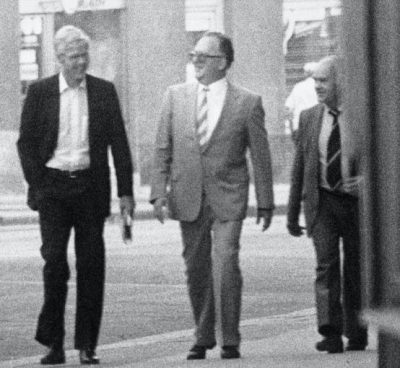Funeral services were held in both Moscow and Oslo this past week for convicted Norwegian spy Arne Treholt. The former journalist, politician and diplomat was long viewed as one of the most controversial Norwegians since World War II.

Treholt, who turned 80 in December, continued to spark both anger and fascination right up until he died after a reportedly short illness at his home in Moscow earlier this month. He was the subject of massive media coverage, several books and documentaries, the latest of which ran on Norwegian Broadcasting (NRK) and landed Treholt back on the front pages. It revealed KGB documents characterizing Treholt as “a source of valuable information.” Treholt was also well-paid for information he’d handed over to KGB agents for years. Oslo newspaper Aftenposten has reported how the money was deposited in Swiss bank accounts.
Russian media reporting his death on February 12 described Treholt as a “former Soviet intelligence agent.” Aftenposten noted how Russian news bureau Regum referred to Treholt as “Norway’s most legendary spy” who “gave the Soviet Union information on Norway’s defense plans, weaknesses within its army, mobilization plans, NATO storage in the country and memoranda to the prime minister.”
Treholt himself continued to firmly deny, however, that he’d ever damaged national security by passing on information that included both Norwegian military and police secrets. After being under surveillance and seen meeting Soviet contacts not only in Oslo but also in Helsinki and Vienna, he was arrested at Oslo’s former main airport at Fornebu on January 20, 1984 and convicted the following year of espionage on behalf of both the Soviet Union and Iraq. He’d also been accused of working for Iraq’s dictatorship while working himself as a highly trusted envoy to the UN in the early 1980s.

Treholt was sentenced to Norway’s longest prison term at the time, 20 years, by an appeals court in Oslo. The former Labour Party politician was later pardoned for health reasons, however, by a Labour Party goverment in 1992, eight years and five months after his conviction. Treholt continued to try to clear his name. Several attempts to get his case reopened failed and he ultimately moved abroad, living in both Russia and Cyprus and working within finance.
Aftenposten commentator Harald Stanghelle, who followed the Treholt case for years, has called Treholt a “genuine child of the postwar social democracy and 1970s’ radical awakening.” He was considered a highly skilled politician and “a social genius,” accordinng to Stanghelle, who could “speak with anyone” and was open and friendly and helpful, to neighbors and acquaintances as well as to Soviet agents. Others, including Treholt’s legendary government minister boss Jens Evensen, were angry that Treholt was disloyal and let them down.
Stanghelle wrote recently that Treholt was also well aware that many Norwegians viewed him as a traitor and were upset by his pardon, part of the reason Treholt ultimately moved abroad while also spending time back in Norway. He’d grown up in the scenic and rural region of Hadeland, north of Oslo, and old friends there never gave him up.
“I have only good things to say, he was my closest and best friend,” Odd Johannes Hovi to the local newspaper Hadeland last week. “He was an enthusiastic leader-type,” active in local athletics organizations in his native Brandbu. Treholt also made a point of running and exercising, and Hovi said he returned to the Hadeland and Vestoppland areas at least two- to three times a year.
Hovi remembers the “shockwaves” following Treholt’s arrest that went through their old gang of friends and not least Treholt’s family. The latter included Treholt’s father who’d also been a top politician and served as agriculture minister in a Labour Party government. In an autobiography from 2005 Treholt admitted he’d operated in “grey zones” but that wasn’t enough of an excuse for his critics and those who felt betrayed by his self-professed attempts to uphold dialogue and contact with the Soviet Union during the Cold War.
Treholt is survived by his son Torstein, who remained in Norway and worked for tycoon Kjell Inge Røkke, along with a daughter-in-law Simona and two grandchildren. Newspaper Aftenposten reported that an open-casket memorial service for him in Moscow late last week attracted a former Soviet fisheries minister, along with relatives, colleagues and friends.
His body was then sent to Norway, where another funeral was held Thursday afternoon at Vestre Gravlund in Oslo. Among those attending were composer and author Ketil Bjørnstad and singer-songwriter Ole Paus carrying a guitar, both of whom performed at the ceremony. Newspaper Dagbladet noted how a banner on one of the wreaths of flowers surrounding Treholt’s casket read: “We will never forget you.”
NewsinEnglish.no/Nina Berglund

